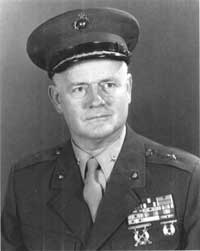| Marines in World War II Commemorative Series |
|
BLOODY BEACHES: The Marines at Peleliu by Brigadier General Gordon D. Gayle, USMC (Ret) Sources The basic source work for this pamphlet is the Marine Corps' official monograph, The Assault on Peleliu, by Maj Frank O. Hough, published by the Government Printing Office in 1950, while LtCol Gordon D. Gayle was serving as deputy director of Marine Corps history, and editor of the monograph series. Other books used in this narrative were: George W. Garand and Truman R. Strobridge, Western Pacific Operations, vol IV, History of U.S. Marine Corps Operations in World War II (Washington: Historical Division, HQMC, 1971); George P. Hunt, Coral Comes High (New York: Harper & Brothers, 1946); E. B. Sledge, With the Old Breed at Peleliu and Okinawa (Presidio Press, 1981); Edward S. Miller, War Plan Orange: The U.S. Strategy to Defeat Japan (Annapolis: Naval Institute Press, 1991); Edward Behr, Hirohito: Behind the Myth (New York: Vantage Books & Random House, 1989); Bill D. Ross, Peleliu: Tragic Triumph, The Untold Story of the Pacific War's Forgotten Battle (New York: Random House, 1992); James H. Hallas, The Devil's Anvil: The Assault on Peleliu (Westport, Connecticut: Praeger, 1944); Harry A. Gailey, Peleliu 1944 (Annapolis, Maryland: Nautical & Aviation Publishing Inc., 1983); Masataka Chihaya, Fading Victory: The Diary of Admiral Matome Ugaki, 1941-45 (University of Pittsburg Press, 1962); Larry L. Woodward, Before the First Wave: The 3rd Armored Amphibian Tractor Battalion — Peleliu and Okinawa (Manhattan, Kansas: Sunflower Univ. Press, 1944); Burke Davis Marine: The Life of Lieutenant General Lewis B. (Chesty) Puller, USMC (Ret) (Boston: Little, Brown Company, 1962).
The Oral History and Personal Papers Collections in the Marine Corps Historical Center, Washington Navy Yard, Washington, D.C. , hold a number of interviews and diaries of participants in the Peleliu operation. These documents from the following were particularly useful: LtGen Oliver P. Smith; BGen Harold D. Harris; BGen Harold O. Deakin; and LtGen Lewis J. Fields, along with numerous personal interviews with campaign veterans — officers and enlisted men. The author wishes to thank the Army Center of Military History for the loan of the photographs of Tom Lea's artwork appearing in this pamphlet. He also wishes to thank Phillip D. Orr for permitting use of the interesting photographs of Peleliu as it appeared in 1994.
Brigadier General Gordon D. Gayle, USMC (Ret), graduated from the U.S. Naval Academy in June 1939 and was commissioned a Marine second lieutenant. After completing Basic School in Philadelphia in 1940, he was assigned to the 5th Marines, 1st Marine Division with which he served in three Pacific campaigns: Guadalcanal, Cape Gloucester, and Peleliu. For his extraordinary heroism while commanding the 2d Battalion, 5th Marines, on Peleliu, he was awarded the Navy Cross. He returned to 1st Marine Division in the Korean war to serve first as the executive officer of the 7th Marines, then as G-3 on the division staff. He is a graduate of the Army's Command and General Staff College. In 1963-65, he chaired the Long Range Study Panel at Quantico, developing concepts for the Corps' operational, organizational, logistical and R&D needs for the 1985 period. He was promoted to brigadier general in 1964. Retiring in 1968, he joined Georgetown University's Center for Strategic and International Studies.
THIS PAMPHLET HISTORY, one in a series devoted to U.S. Marines in the World War II era, is published for the education and training of Marines by the History and Museums Division, Headquarters, U.S. Marine Corps, Washington, D.C., as a part of the U.S. Department of Defense observance of the 50th anniversary of victory in that war. Editorial costs of preparing this pamphlet have been defrayed in part by a grant from the Marine Corps Historical Foundation and a bequest from the estate of Emilie H. Watts, in memory of her late husband, Thomas M. Watts, who served as a Marine and was the recipient of a Purple Heart.
DIRECTOR OF MARINE CORPS HISTORY AND MUSEUMS GENERAL EDITOR, CARTOGRAPHIC CONSULTANT EDITING AND DESIGN SECTION, HISTORY AND MUSEUMS DIVISION Marine Corps Historical Center 1996 PCN 190 003137 00
|



